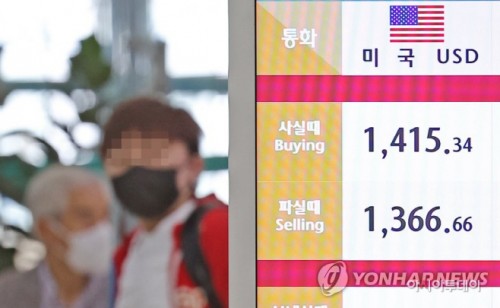 |
| In the midst of growing concerns about prolonged inflation due to the higher-than-expected inflation data in the United States, a screen at a bank in Seoul shows the currency exchange rate. The South Korean currency on Wednesday hit below the 1,390 won mark against the greenback for the first time in over 13 years. / Source: Yonhap News |
AsiaToday reporter Oh Kyung-hee
The South Korean financial market was shaken by the US inflation shock. The South Korean currency on Wednesday tumbled below the 1,390 won mark against the greenback for the fist time in over 13 years. The domestic stock market also fell more than 1 percent. Market observers say this is due to risk-averse sentiment has expanded as the US is expected to carry out aggressive monetary tightening to curb inflation. The stagflation fears in the Korean economy are growing due to the high exchange rate, high interest rates, and high inflation.
The local currency closed at 1,390.9 won against the US dollar, down 17.3 won from the previous session’s close. This marks the weakest figure for the country’s currency since March 2009 when it topped 1,422 won in the aftermath of the global financial crisis. The benchmark KOSPI ended down 38.12 points, or 1.56 percent, at 2,411.42. The tech-heavy KOSDAQ dropped, falling 1.74 percent, to close at 782.93.
Fears of inflation from the US shook the Korean financial market. This is because the US’ consumer price index jumped 8.3 percent in August from a year earlier, higher than market expectations of 8 percent rise, raising concerns about intensive tightening by the US Federal Reserve (Fed). Speculation over a third giant rate hike of 75 basis points by the US Fed at the Federal Open Market Committee (FOMC) next week runs higher than ever. Some even predict that the Fed could take the “ultra step” by raising the key interest rate by a 1 percentage point at the FOMC.
As the Fed’s monetary tightening is expected, ‘emergency lights’ have been turned on for the Korean economy. If domestic rates trend lower than US rates, capital outflows could pile more pressure on the currency. Foreigners sold off about a net 164.2 billion won worth of local equities. Currently, the base rate of South Korea and the US is at 2.5 percent per annum. But if the US Fed raises interest rates further this month, the gap would widen immediately. Besides, if the exchange rate rises due to an interest rate hike, import prices and domestic consumer prices would rise. Exporting companies are unlikely to benefit from the weak won. This is because the currency of their competitors, such as the yen and the yuan, is also depreciating.
The woes of the Bank of Korea (BOK), the country’s central bank, are deepening. If it raises the interest rate higher than expected, the exchange rate could be defended but the economic recession may be prolonged due to increased loan burden of household. The BOK will hold a meeting on Oct. 12 to determine the extent of the base rate hike. Normally, the BOK raised interest rates by 0.25 percentage points, but it raised the interest rate by 0.50 percentage points in July for the first time in history. It might take another ‘big step’.
“The financial authorities are sending out signals to economic players that it is not easy to raise interest rates, dropping the value of the domestic currency and unsettling the foreign exchange market,” said Sung Tae-yoon, an economics professor from Yonsei University in Seoul. “The outlook for the Korean economy is pessimistic. External difficulties such as global inflation and US interest rate hikes are intensifying the economic hardship,” he added.
#won #US Fed #inflation #currency #interest rate
Copyright by Asiatoday
Most Read
-
1
-
2
-
3
-
4
-
5
-
6
-
7





















